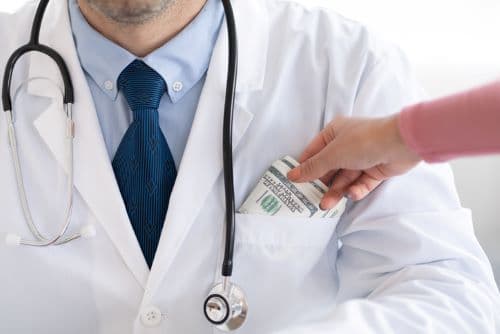It happened again.
A big pharmaceutical company has admitted to bribing doctors.
Novartis Pharmaceuticals paid $678 million to settle a case in which it was accused of giving thousands of dollars to doctors in return for prescribing the company’s medicines.
Besides cash, the drug giant lavished doctors with expensive dinners, wine tastings, sporting events, and even trips to Hooters.
The settlement stems from 2013. That’s when the U.S. joined a lawsuit against Novartis that had been started two years earlier by a whistleblower…one of their former sales representatives.
He said the company set up a “speakers program.” Doctors appeared but “gave no meaningful presentations,” said federal prosecutors. The physicians were there to be showered with cash, alcohol, and costly meals.[1]
Novartis allegedly gave doctors “honorariums” of as much as $220,000.[2]
As bad as all that is, it’s certainly not the first time Big Pharma has been caught bribing doctors…
- A 2017 large-scale national study published in the American Journal of Public Health showed that one in five family doctors are getting payoffs from companies who sell opioid painkillers.[3]
Opioid overdoses now kill some 65,000 Americans a year. But that hasn’t stopped drug companies from being more aggressive than ever in pushing their addictive pain pills.
The study found that opioid sellers spread $46 million in payments to doctors over a two-year period.
The payments “add up to a shocking number and may have a wide-reaching influence on physician behavior,” said Dr. Scott Hadland. He’s a pediatrician and adolescent addiction specialist at the Brown University School of Public health. Dr. Hadland led the study.
- Researchers at Drexel University randomly surveyed more than 3,500 adults who had visited a doctor within the previous year. Then they checked subjects’ doctors against data from Open Payments. It’s a government website that reports pharmaceutical and medical device industry payments to physicians.[4]
They found that 65% of the doctors had received payments or gifts in the past year from drug and/or device manufacturers.[5]
That came on the heels of another report that directly tied drug company payoffs to doctors’ prescribing habits. The study showed that doctors who receive more than $5,000 from drug companies prescribe the most brand-name drugs to their patients.[6]
- A study found that drug companies paid U.S. doctors $2.4 billion (that’s billion with a b) in cash and gifts in 2015.
These bribes helped persuade doctors to prescribe pricey brand name medications instead of cheaper generics, which keeps Big Pharma’s $60 billion annual revenue stream flowing.
The drug companies no longer even try to hide the payoffs, said Dr. R. Adams Dudley, a pulmonologist and professor with the University of California, San Francisco. He wrote an editorial accompanying the drug payola study.
“(Pharmaceutical firms) themselves say in their internal documents—if you want to influence a doctor, get them a meal, get a gift,” he said.[7]
UCLA Professor Ian Larkin was lead author of the study. Besides cold, hard cash, drug companies try to influence doctors in other ways. “It’s a very common practice for a pharma rep to show up with a box of sandwiches or a stack of pizzas” for the doctors to share with staff, he said.
Added Dr. Dudley: “Many doctors would say they can’t be bought for the low amounts we’re talking about, but the amounts actually aren’t that low. Many, many doctors are getting thousands of dollars. It’s hard to imagine that is not influential.”
Professor Larkin found that when drug reps are banned from doctors’ offices, prescribing habits change.
“If a doctor was prescribing a drug 100 times a month, our estimate is it would go down to about 92 times a month after the restrictions were put in place,” he said. “That’s a very substantial change.”[8]
How to Know If Your Doctor Is On Big Pharma’s Payroll
It’s easy to find out if your doctor is accepting drug company money. By law, pharmaceutical firms must disclose doctor payments.
The nonprofit investigative website ProPublica tracks the payments. Simply go to the site and type in your doctor’s name and the state in which he or she practices.
You’ll instantly see if they’re on Big Pharma’s payroll. It will tell you exactly how much your doctor has been paid and where payments came from.
It’s important to make sure that when your doctor prescribes a drug to you they are thinking about your health…and not a healthy check from a pharmaceutical firm.
Editor’s Note: Unlike much of the mainstream media, we don’t accept advertising from Big Pharma. That’s why you can count on us for unbiased medical information. Our only motivation is your good health. Subscribe to our newsletter, Independent Healing. Each month it brings you important health news you won’t find anywhere else. To subscribe, go HERE.
Related Articles
Big Pharma’s Fish Oil Takeover
Like this Article? Forward this article here or Share on Facebook.
[1]https://www.bloomberg.com/news/articles/2020-07-01/novartis-to-pay-678-million-to-resolve-doctor-kickback-claims
[2]https://www.bloomberg.com/news/articles/2020-07-01/novartis-to-pay-678-million-to-resolve-doctor-kickback-claims
[3]https://www.eurekalert.org/pub_releases/2017-08/bumc-1i1080917.php
[4]https://www.eurekalert.org/pub_releases/2017-03/du-toa030617.php
[5]http://www.sgim.org/about-us/news-and-initiatives/industry-payments-to-doctors
[6]https://www.propublica.org/article/doctors-who-take-company-cash-tend-to-prescribe-more-brand-name-drugs
[7]https://consumer.healthday.com/general-health-information-16/doctor-news-206/half-of-u-s-docs-get-payments-from-drug-device-industries-study-722236.html
[8]https://medicalxpress.com/news/2017-05-doctors-heavily-drugs.html

